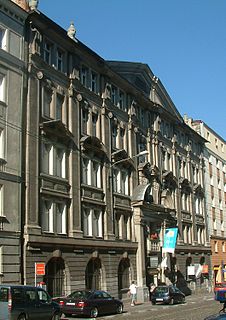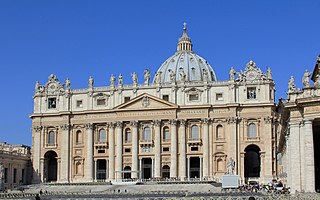
The British Academy is the United Kingdom's national academy for the humanities and the social sciences. It was established in 1902 and received its royal charter in the same year. It is now a fellowship of more than 1,000 leading scholars spanning all disciplines across the humanities and social sciences and a funding body for research projects across the United Kingdom. The academy is a self-governing and independent registered charity, based at 10–11 Carlton House Terrace in London.
A learned society is an organisation that exists to promote an academic discipline, profession, or a group of related disciplines such as the arts and science. Membership may be open to all, may require possession of some qualification, or may be an honour conferred by election.
A national academy is an organizational body, usually operating with state financial support and approval, that co-ordinates scholarly research activities and standards for academic disciplines, most frequently in the sciences but also the humanities. Typically the country's learned societies in individual disciplines will liaise with or be co-ordinated by the national academy. National academies play an important organizational role in academic exchanges and collaborations between countries.

The Hungarian Academy of Sciences is the most important and prestigious learned society of Hungary. Its seat is at the bank of the Danube in Budapest, between Széchenyi rakpart and Akadémia utca. Its main responsibilities are the cultivation of science, dissemination of scientific findings, supporting research and development and representing Hungarian science domestically and around the world.

The Polish Academy of Sciences is a Polish state-sponsored institution of higher learning. Headquartered in Warsaw, it is responsible for spearheading the development of science across the country by a society of distinguished scholars and a network of research institutes. It was established in 1951, during the early period of the Polish People's Republic following World War II.

Bhikhu Chotalal Parekh, Baron Parekh, is a British political theorist, academic, and life peer. He is a Labour Party member of the House of Lords. He was Professor of Political Theory at the University of Hull from 1982 to 2001, and Professor of Political Philosophy at the University of Westminster from 2001 to 2009. He was President of the Academy of Social Sciences between 2003 and 2008.

The Poznań Society of Friends of Learning is a learned society in Poznań, Poland, established in 1857, of scholars and scientists in all branches of learning. It has been one of the largest and most important general learned organizations in Poland.
The American Council of Learned Societies (ACLS), founded in 1919, is a private, nonprofit federation of 75 scholarly organizations in the humanities and related social sciences. It is best known for its fellowship competitions which provide a range of opportunities for scholars in the humanities and related social sciences at all career stages, from graduate students to distinguished professors to independent scholars, working with a number of disciplines and methodologies in the U.S. and abroad.

The Bavarian Academy of Sciences and Humanities is an independent public institution, located in Alfons-Goppel-Str. 11, Munich, Germany. It appoints scholars whose research has contributed considerably to the increase of knowledge within their subject. The general goal of the academy is the promotion of interdisciplinary encounters and contacts and the cooperation of representatives of different subjects.
The Finnish Academy of Science and Letters is a Finnish learned society. It was founded in 1908 as a Finnish-language counterpart of the Swedish-language Finnish Society of Sciences and Letters, which had existed since 1838.

The Norwegian Academy of Science and Letters is a learned society based in Oslo, Norway.

Carole Pateman is a feminist and political theorist. She is known as a critic of liberal democracy and has been a member of the British Academy since 2007.
The American Academy of Political and Social Science was founded in 1889 to promote progress in the social sciences. Sparked by Professor Edmund J. James and drawing from members of the faculty of the University of Pennsylvania, Swarthmore College, and Bryn Mawr College, the Academy sought to establish communication between scientific thought and practical effort. The goal of its founders was to foster, across disciplines, important questions in the realm of social sciences, and to promote the work of those whose research aimed to address important social problems. Today the AAPSS is headquartered at the Annenberg Public Policy Center at the University of Pennsylvania in Philadelphia and aims to offer interdisciplinary perspectives on important social issues.

The Cuban Academy of Sciences is Cuba's Academy of Sciences, with headquarters in the National Capitol building in Havana. It is described as the oldest active national academy of sciences outside Europe. The Academy is an official institution of the Cuban state with a national scope, independent and consultative in the area of science, and the successor of the former Royal Academy of Medicine, Physical and Natural Sciences of Havana, and is also attached to the Ministry of Science, Technology and the Environment.

The Austrian Academy of Sciences is a legal entity under the special protection of the Republic of Austria. According to the statutes of the Academy its mission is to promote the sciences and humanities in every respect and in every field, particularly in fundamental research.

Founded in 1938, the Estonian Academy of Sciences is Estonia's national academy of science in Tallinn. As with other national academies, it is an independent group of well-known scientists whose stated aim is to promote research and development, encourage international scientific cooperation, and disseminate knowledge to the public. As of March 2017, it had 77 full members and 20 foreign members. Since 15 October 2014, the president of the Academy is the mathematician Tarmo Soomere.
The Learned Society of Wales is a learned society and charity that exists to "celebrate, recognise, preserve, protect and encourage excellence in all of the scholarly disciplines", and to serve the Welsh nation.
The Fellowship of the Academy of Social Sciences (FAcSS) is an award granted by the Academy of Social Sciences to leading academics, policy-makers, and practitioners of the social sciences.











